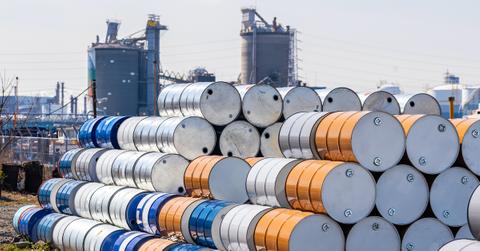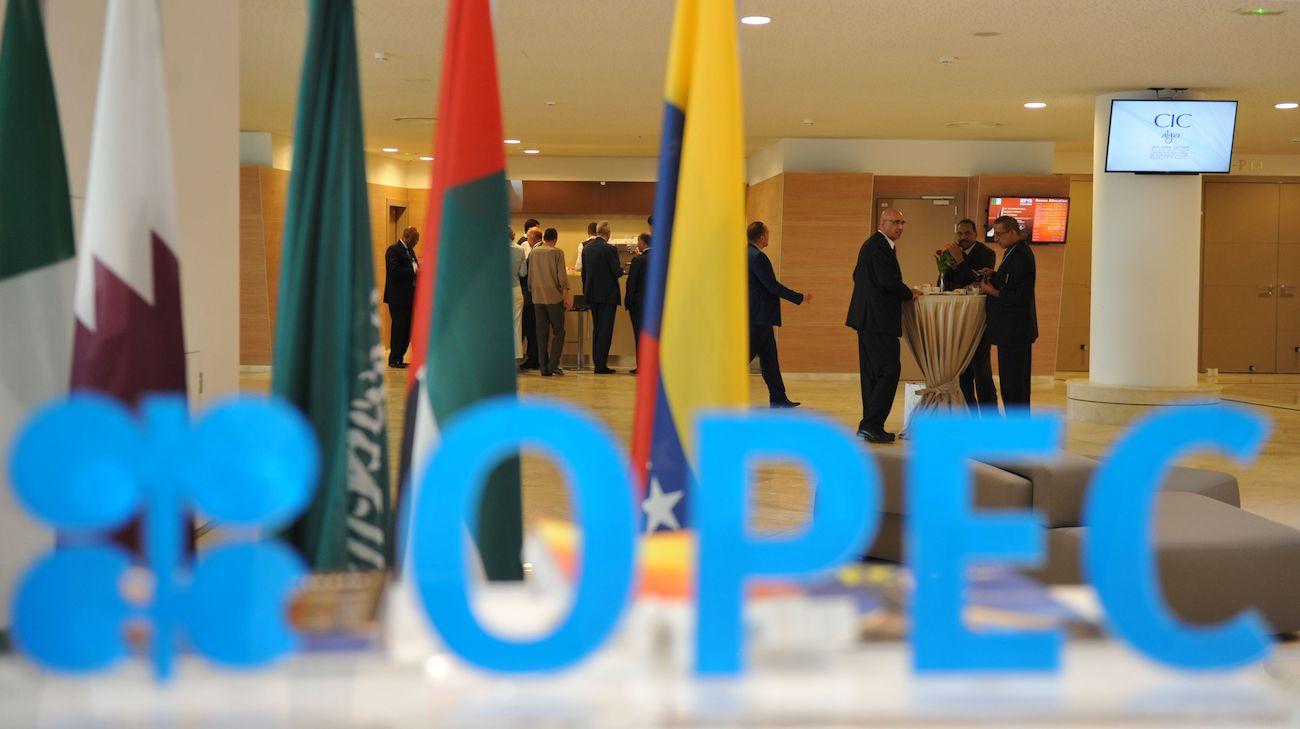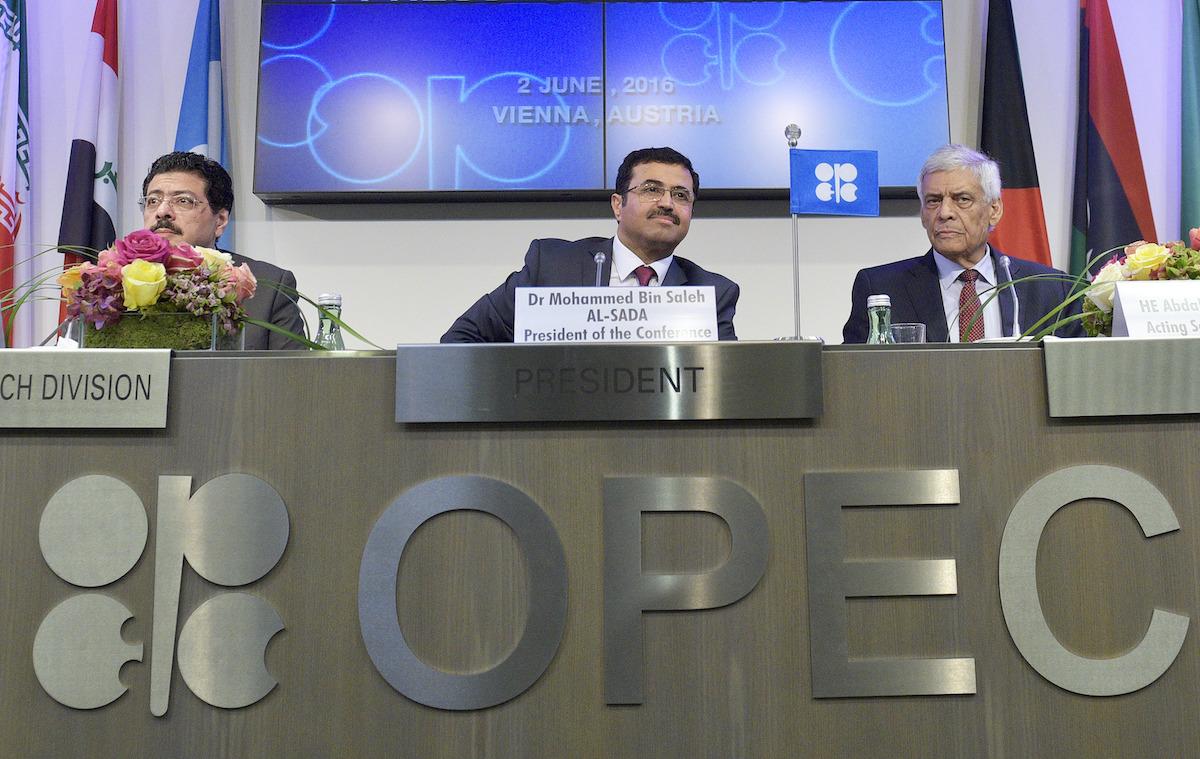Oil Industry Reduces Global Production by 9.7 Million Barrels Per Day
Is this enough to significantly slow down the climate crisis?
Updated Nov. 19 2020, 9:40 p.m. ET

Pretty much every market (besides Zoom and other video chat services, of course) is taking a hit during the COVID-19 pandemic — including the all-powerful oil industry. With a current reduced demand for oil, and with oil prices currently way down, oil cartel OPEC just signed a deal to cut 9.7 million barrels of oil per day from global production during the months of May and June 2020, followed by other less stringent cuts through April 2022. But is that enough to significantly slow down the climate crisis?
Even though the U.S. is not a member of OPEC, President Trump reportedly had a lot of involvement in this deal, which is the largest oil output reduction of all time, according to CNBC.
Here’s everything you need to know about OPEC, the new deal, and how it will impact the planet after the coronavirus pandemic ends.
What does OPEC stand for?
OPEC stands for the Organization of the Petroleum Exporting Countries.
What is OPEC?

OPEC is an international union of 13 nations whose mission is to “is to coordinate and unify the petroleum policies of its Member Countries and ensure the stabilization of oil markets in order to secure an efficient, economic and regular supply of petroleum to consumers, a steady income to producers and a fair return on capital for those investing in the petroleum industry.” Effectively, OPEC sets the world’s oil prices, makes sure they don’t dip too low, and reduces competition in the oil industry.
Is OPEC a cartel?
OPEC is a cartel, which is an association of manufacturers whose goal is to maintain high prices. Cartels are illegal in the U.S., but since OPEC largely sets global petroleum prices, the U.S. is not exempt from the group’s influence — and the group is not exempt from the U.S. government’s influence.
OPEC can also be seen as an oligopoly, which is when a small group of large sellers dominates an industry — similar to monopolies, oligopolies restrict competition, and are technically legal in the U.S. as long as no collusion occurs.
What countries are in OPEC?
The 13 member countries of OPEC are Algeria, Angola, Congo, Equatorial Guinea, Gabon, Iran, Iraq, Kuwait, Libya, Nigeria, Saudi Arabia, United Arab Emirates, and Venezuela.
What is OPEC Plus?
OPEC Plus, aka OPEC+, refers to OPEC along with a group of oil-producing countries who are not technically members of OPEC, but are allies to OPEC. These allied countries include Russia and Mexico. The U.S. is not a member of OPEC+, but as the world leader in oil production, it may as well be one.
OPEC+ is cutting oil production amidst the coronavirus.

This week, OPEC+ agreed to reduce oil production by 9.7 million barrels per day during May and June, to help correct the imbalance in supply and demand brought on by the COVID-19 pandemic. As mentioned above, this is the biggest slash in oil production the world has ever seen. From July through December of 2020, production will pick back up to an overall reduction of 7.7 million barrels per day; and from January 2021 through April 2022, cuts will only be 5.8 million per day.
Each country will cut back on production by varying (mostly undisclosed) amounts. U.S. Energy Secretary Dan Brouillette said that the U.S. will cut production of between 2 million and 3 million barrels per day by the end of 2020, as per CNBC.
This agreement comes about a month into the current “oil crisis,” which started when Russia wouldn’t agree to the cuts Saudi Arabia and other OPEC members proposed, as per The New York Times. It took a month, but OPEC+ has finally come to an agreement.
How many barrels of oil are produced per day?
9.7 million barrels of oil is certainly a lot of oil, and it’s a significant cut — but there’s still a lot more being produced. According to the U.S. Energy Information Administration (EIA), around 100.63 million barrels of oil were produced globally every day in 2019. That means daily oil production is going down by about 10 percent for those two upcoming months.
The U.S. is the No. 1 oil producer in the world (not exactly something to be proud of), with the country responsible for 19.51 million barrels of oil per day — that’s 19 percent of the world’s total daily output.
OPEC+’s oil cuts are not enough to solve the climate crisis.
We need to slash daily oil production by a lot more than 10 percent to save our climate. Many experts believe that to significantly mitigate emissions and stop the climate crisis, governments all around the world need to divest from fossil fuels (including oil, coal, and natural gas) and shift to a renewable energy economy (a worldwide reliance on clean energy sources such as wind, hydro, solar, and geothermal).
Trump allegedly pressured OPEC+ to sign this deal.
As reported by the Financial Times, Trump — who has criticized OPEC throughout his three years in the White House — pressured OPEC and its allies to sign this deal in light of the coronavirus pandemic’s impact on the economy. Trump pushed for this deal in hopes that it would protect U.S. jobs and raise petroleum prices — though it’s hard to tell if this deal will actually be able to achieve that, according to The New York Times.
“The big Oil Deal with OPEC Plus is done,” Trump tweeted on Sunday. “This will save hundreds of thousands of energy jobs in the United States. I would like to thank and congratulate President Putin of Russia and King Salman of Saudi Arabia. I just spoke to them from the Oval Office. Great deal for all!”
What impact will the OPEC Plus deal have?
According to CNN, Goldman Sachs analysts believe the cuts are insufficient, and “too little and too late to avoid breaching storage capacity.” Just like fossil fuels themselves, storage space for fossil fuels is finite — if we keep drilling for oil while the demand is so low, we could run out of storage space, and have yet another crisis on our hands.
"The OPEC+ deal, although well-meaning in intent, wholeheartedly fail[s] to address the supply [and] demand basis confronting the world," Jeffrey Halley, senior market analyst for Asia Pacific at Oanda, told CNN. "It can at best only put a floor under oil prices at their March lows."
With less fossil fuels being burned due to coronavirus lockdowns, cities all over the planet have been experiencing lower emissions and less air pollution. It will be interesting to see how oil production going down will impact the planet over the next few months — but if we want anything beyond temporary change, the world’s major oil producers will need to cut back far more than 10 percent.